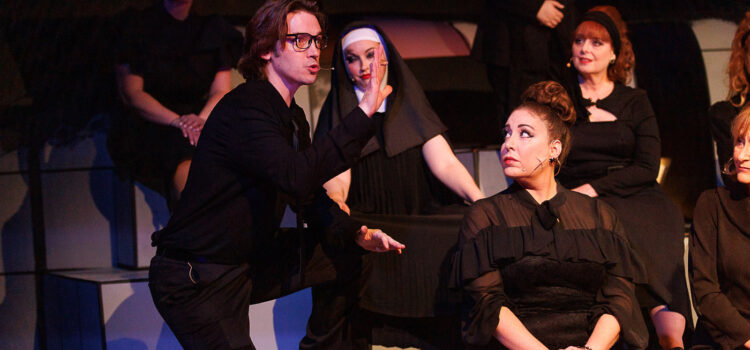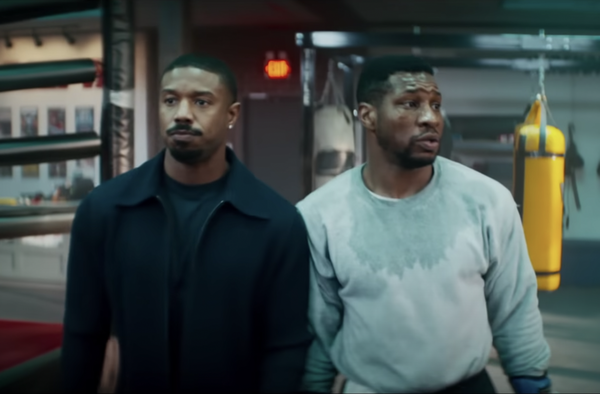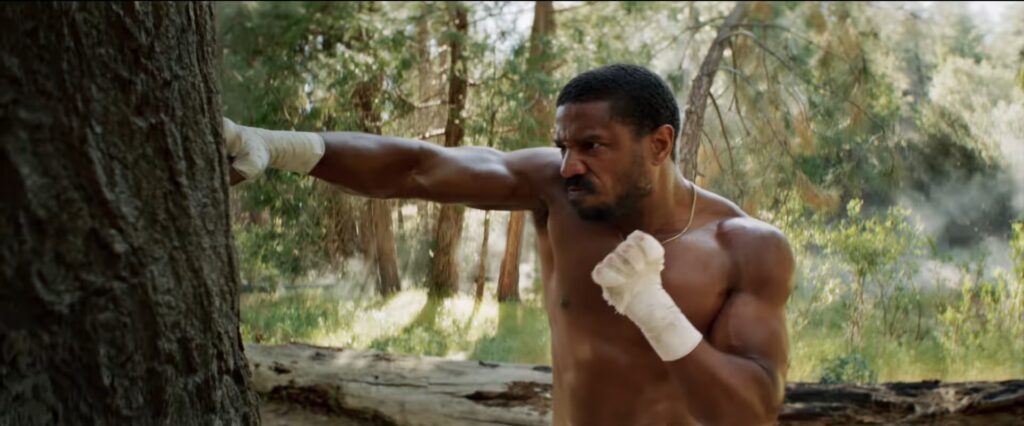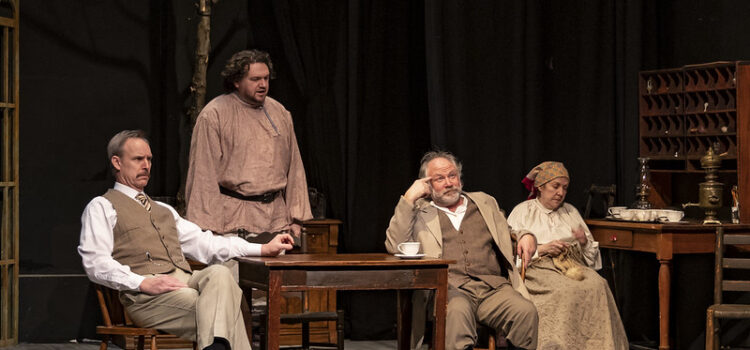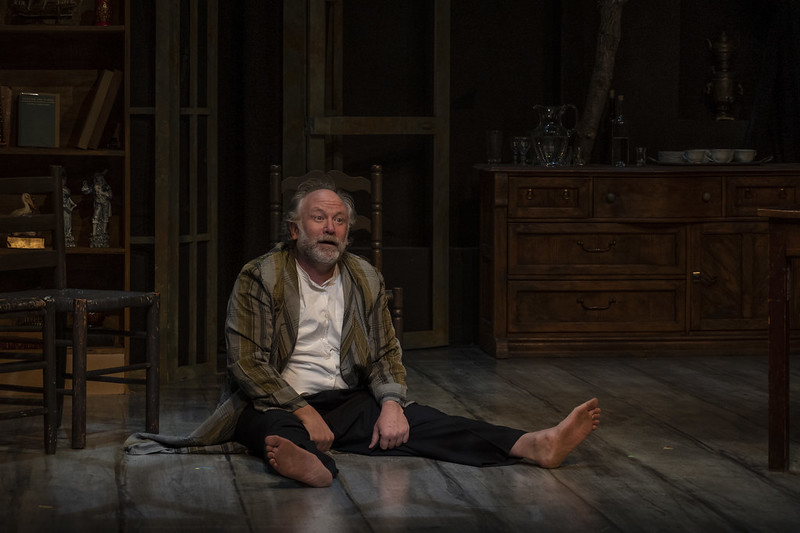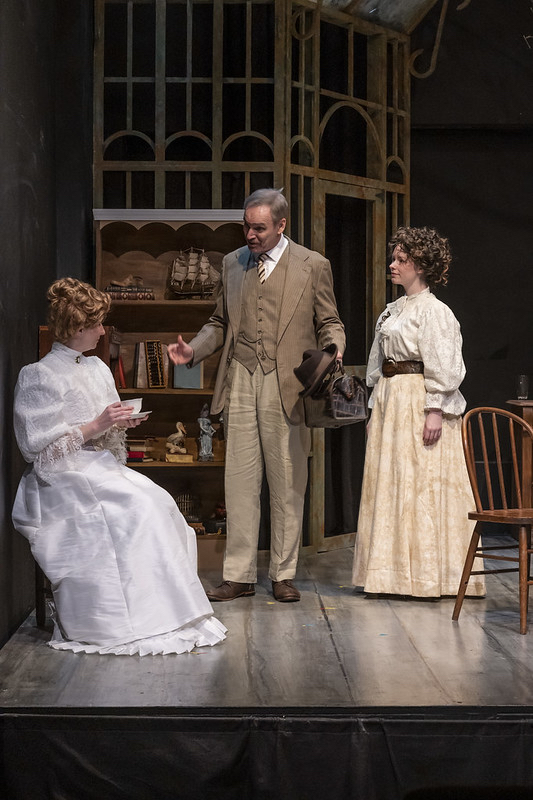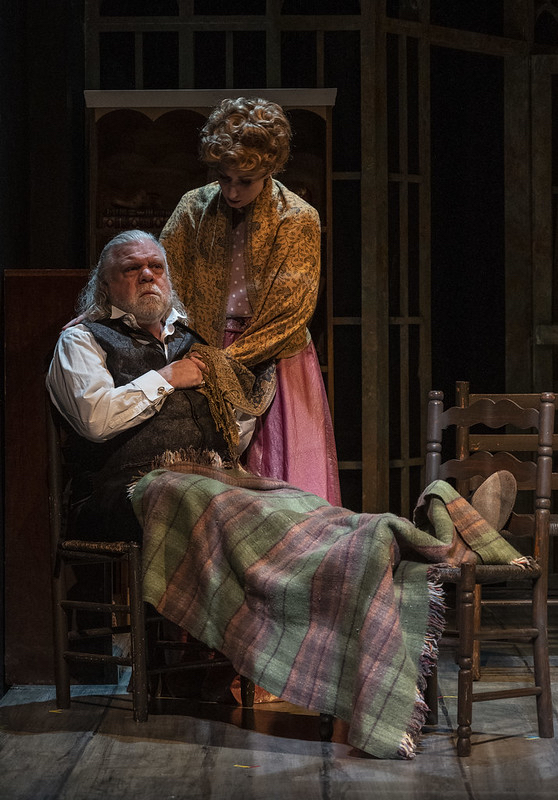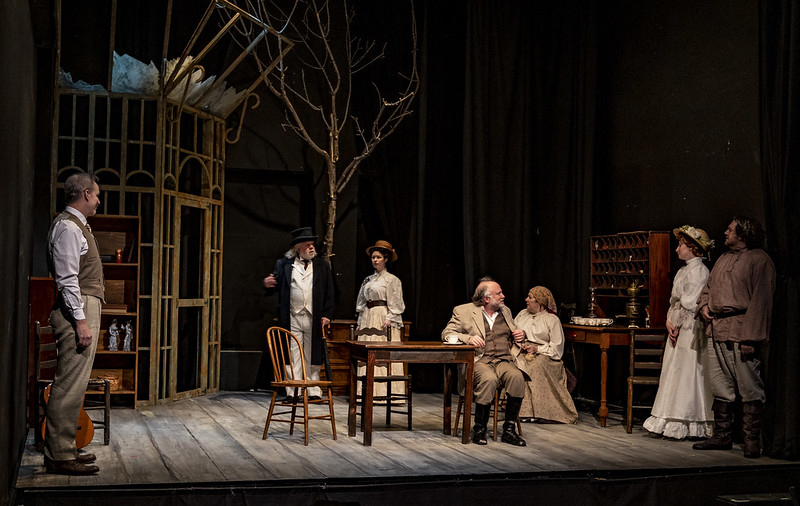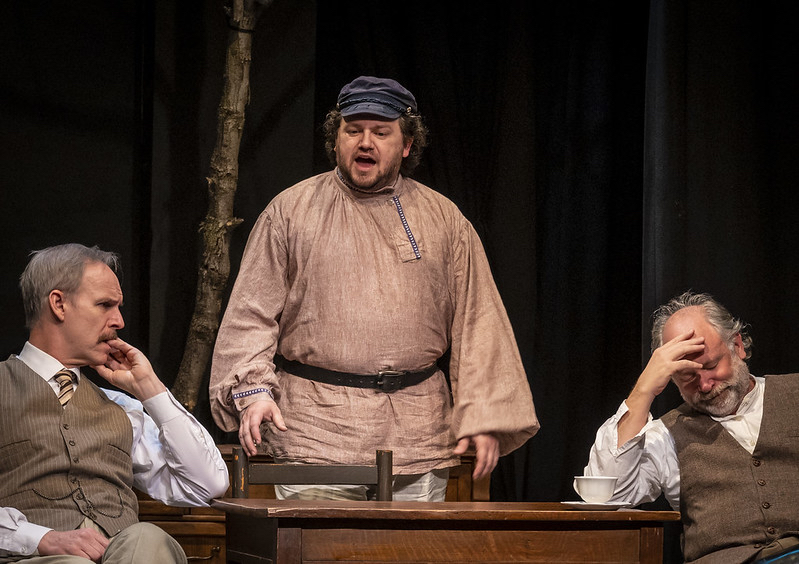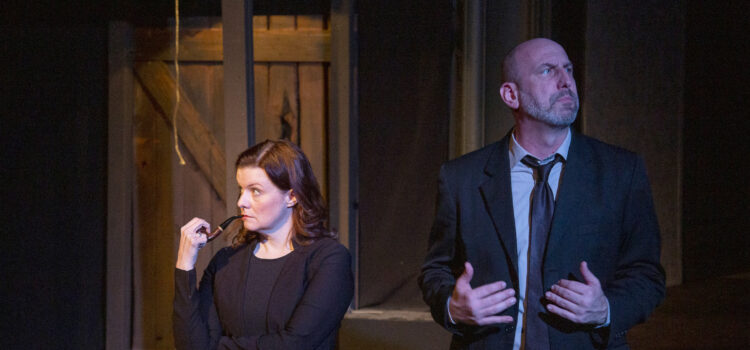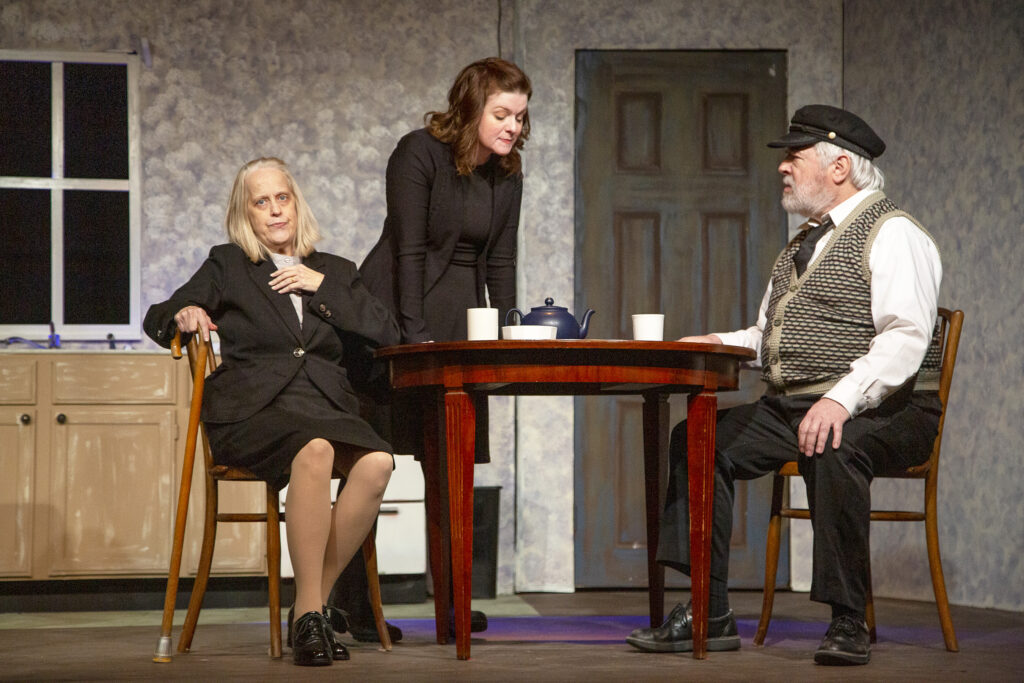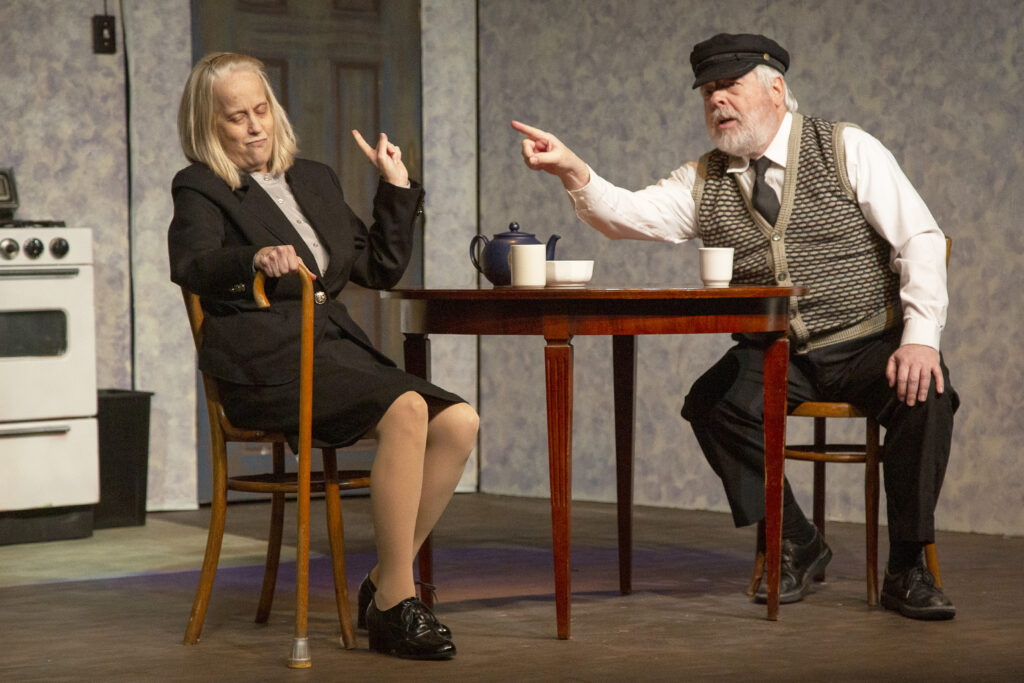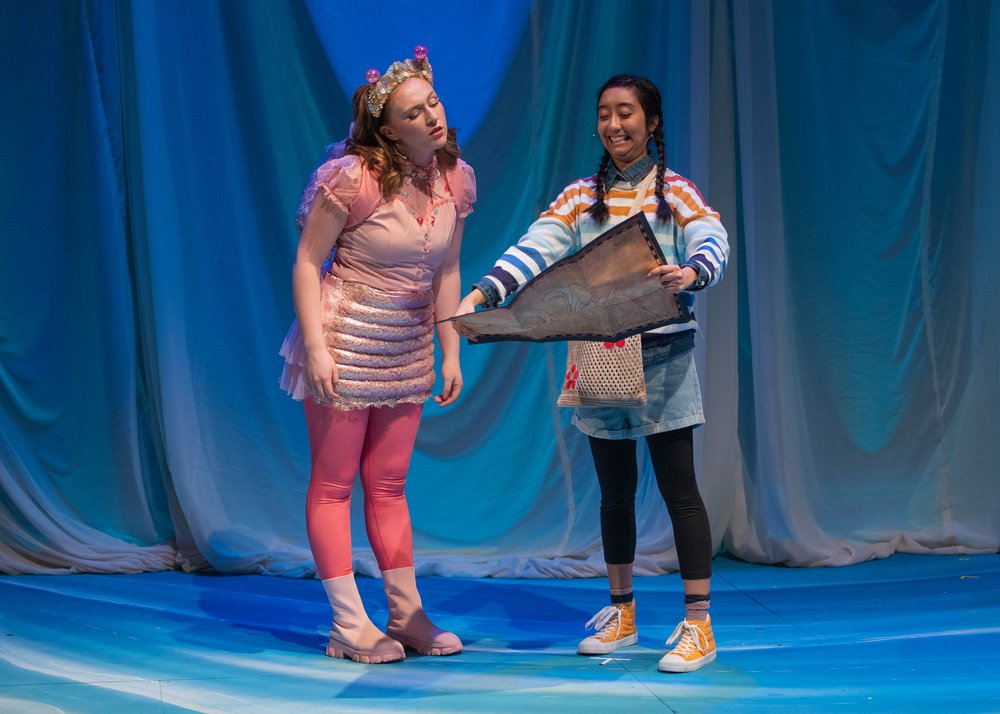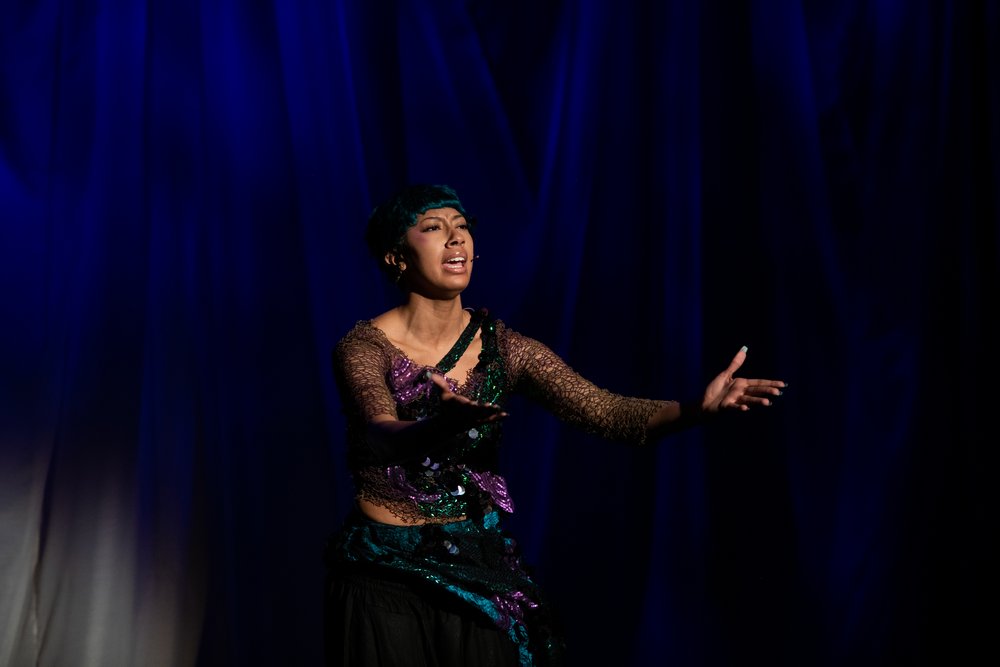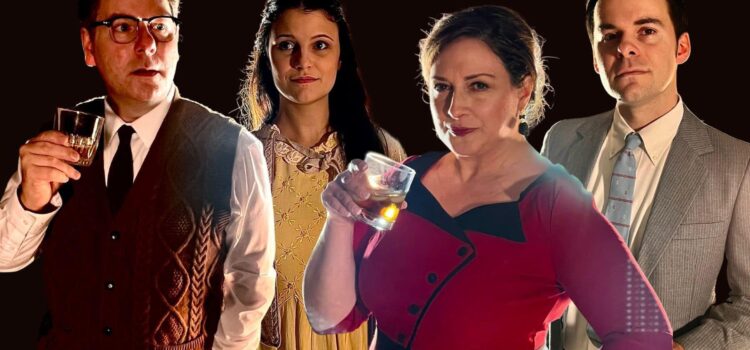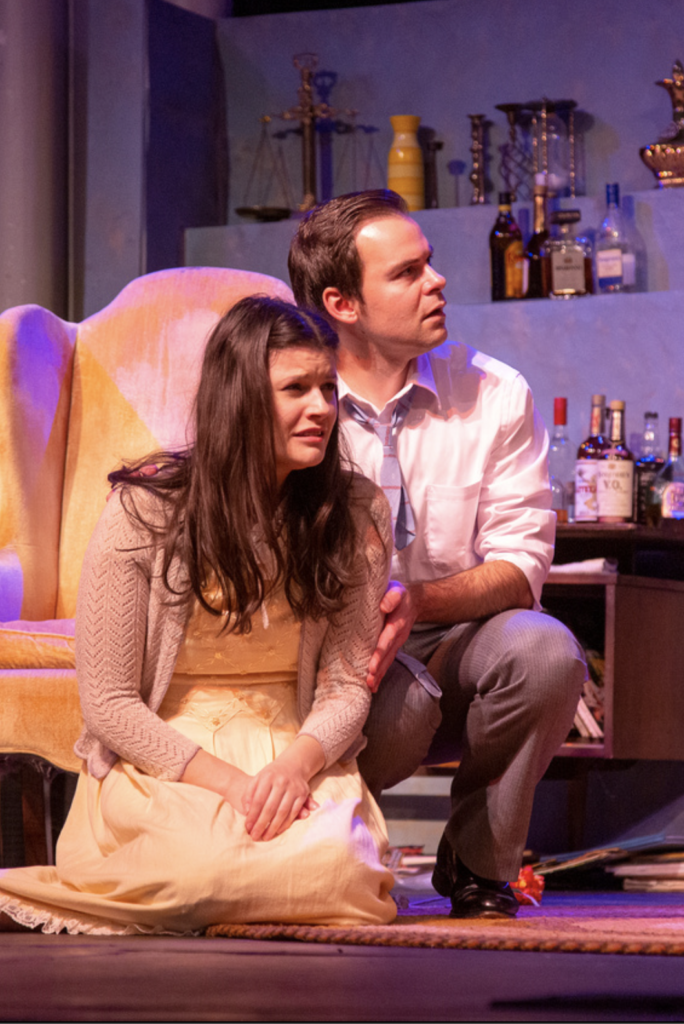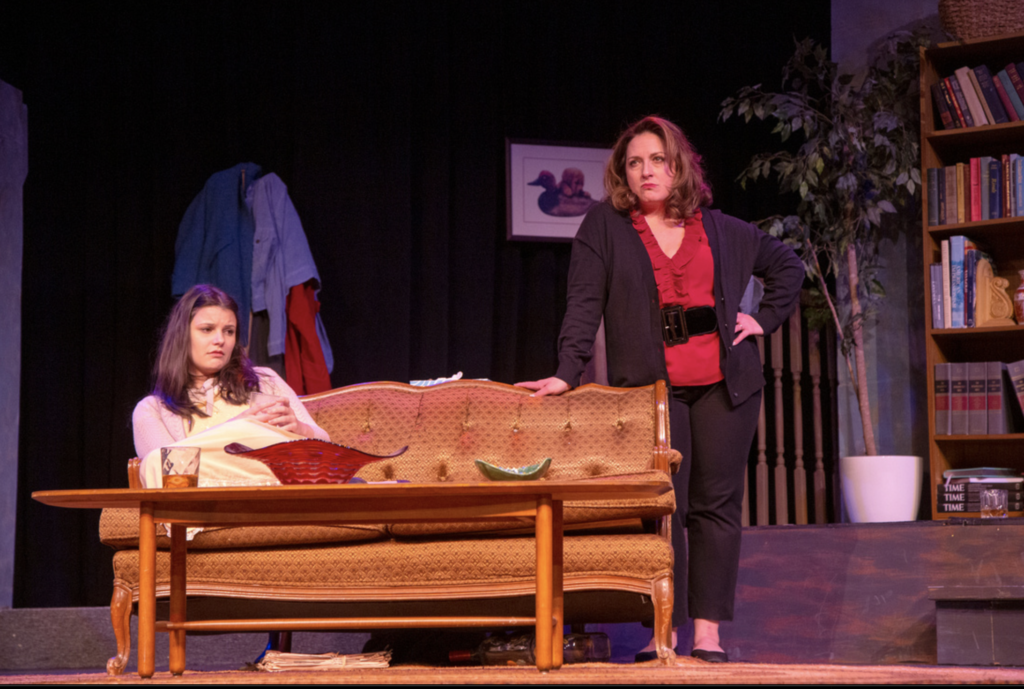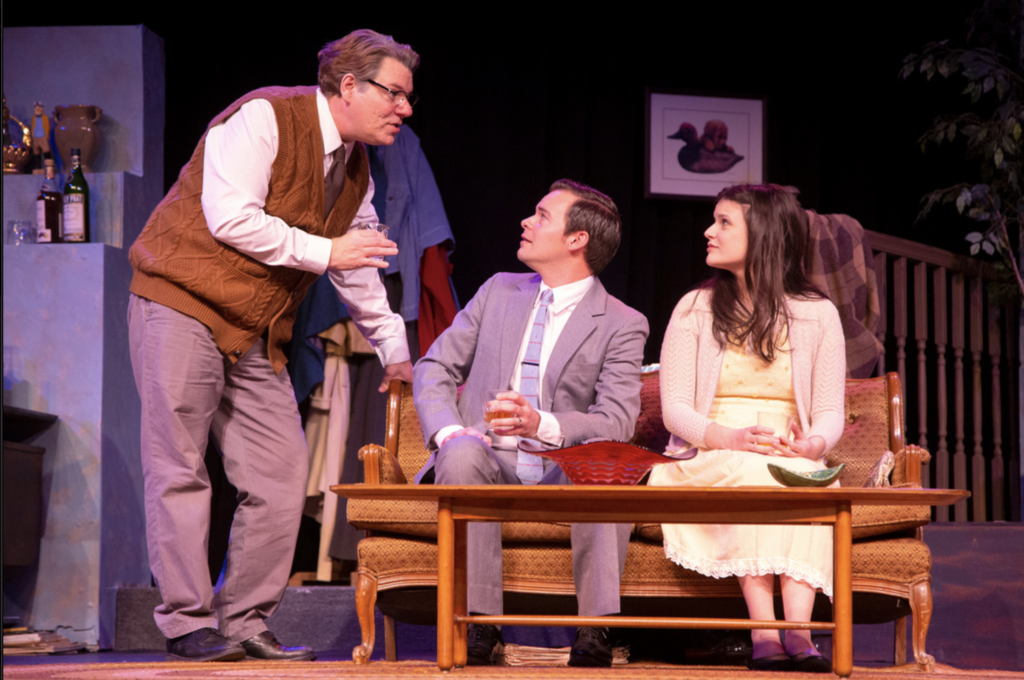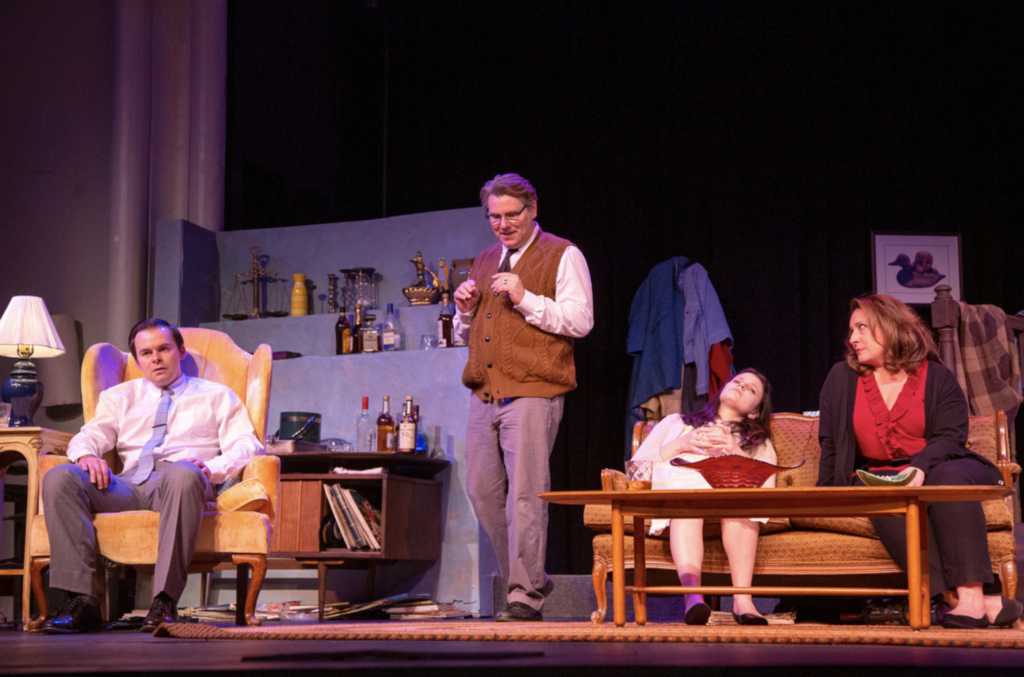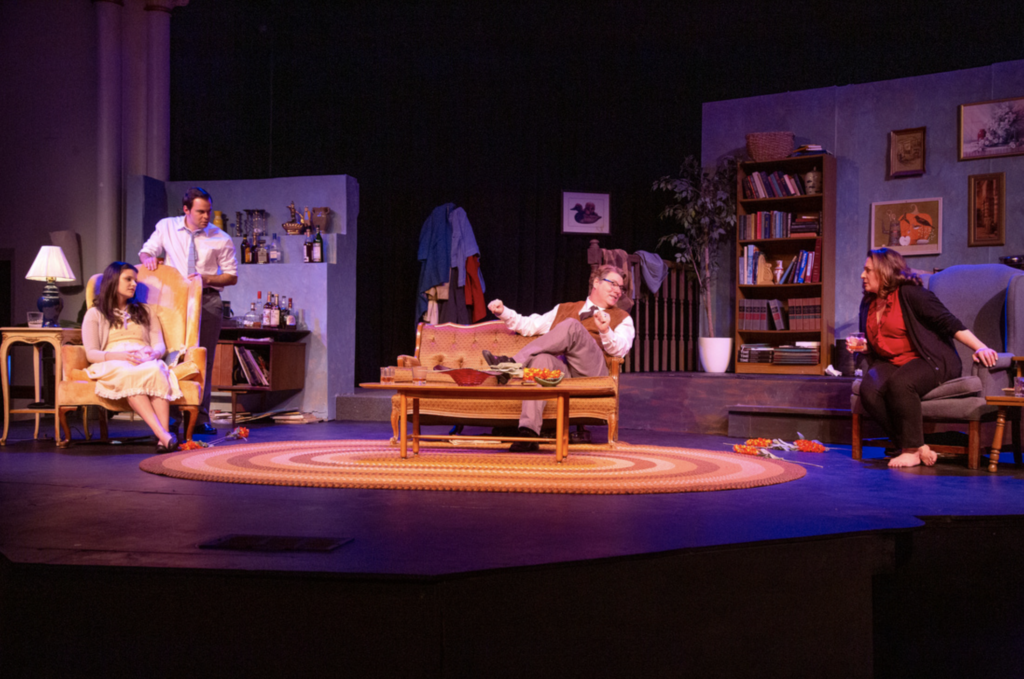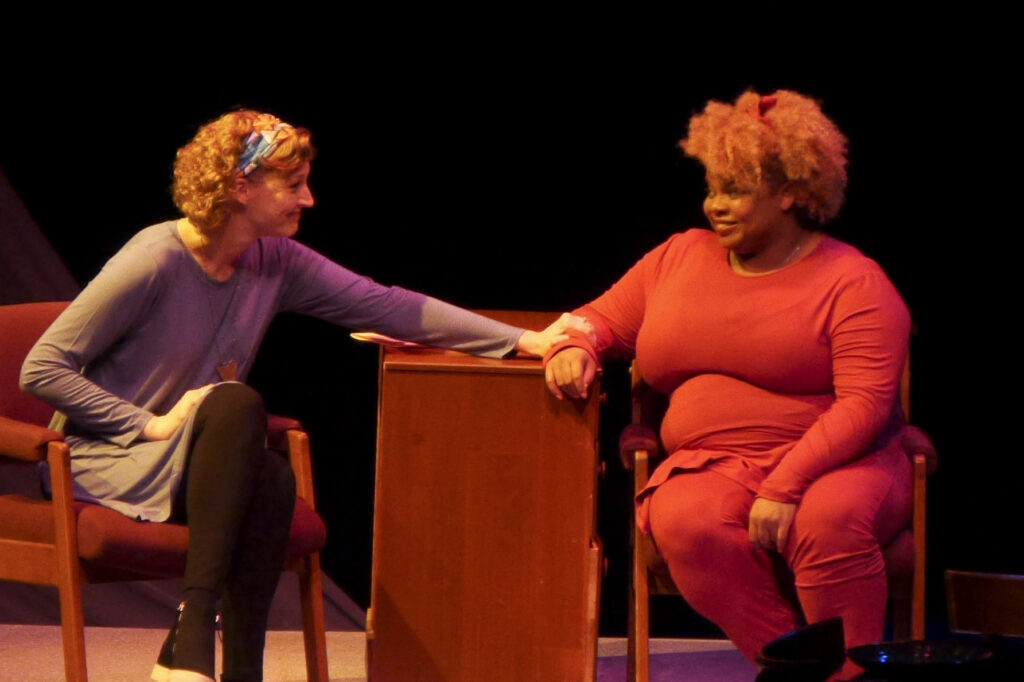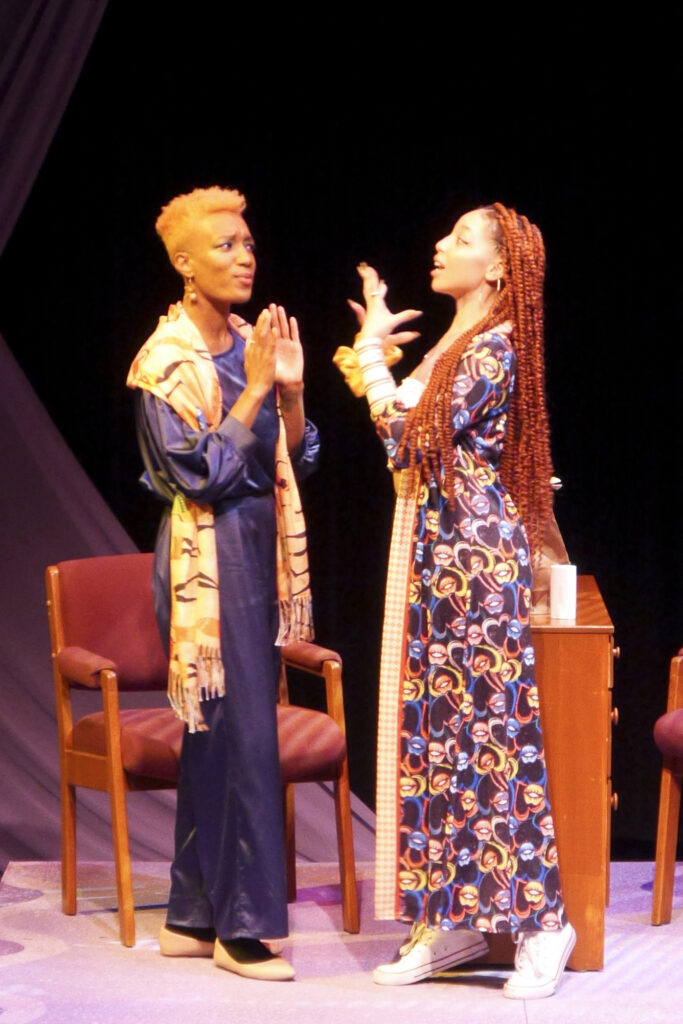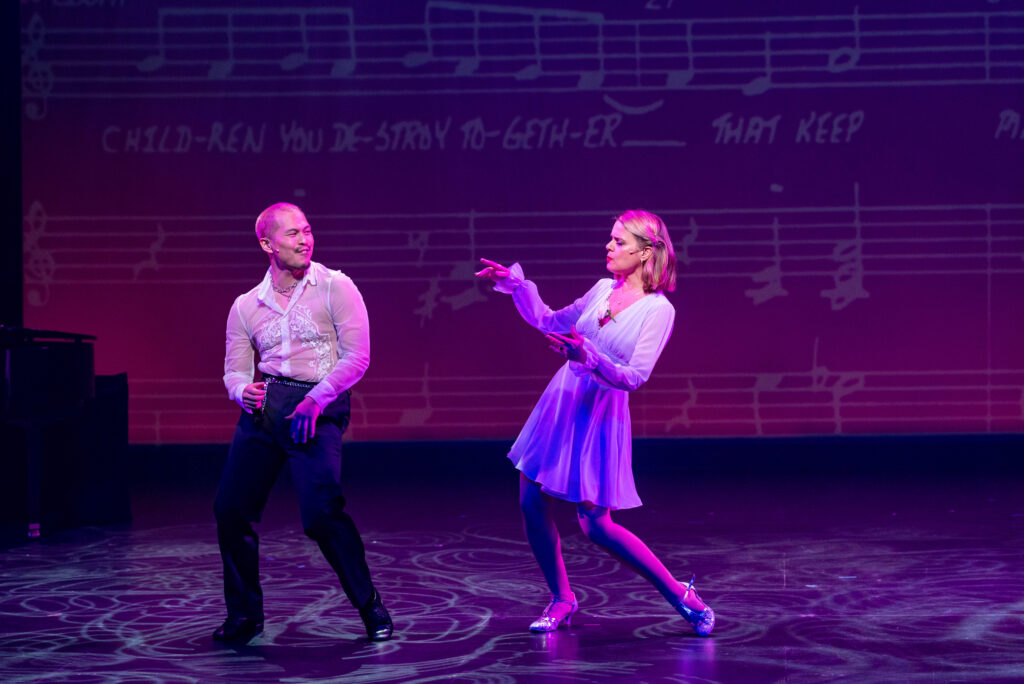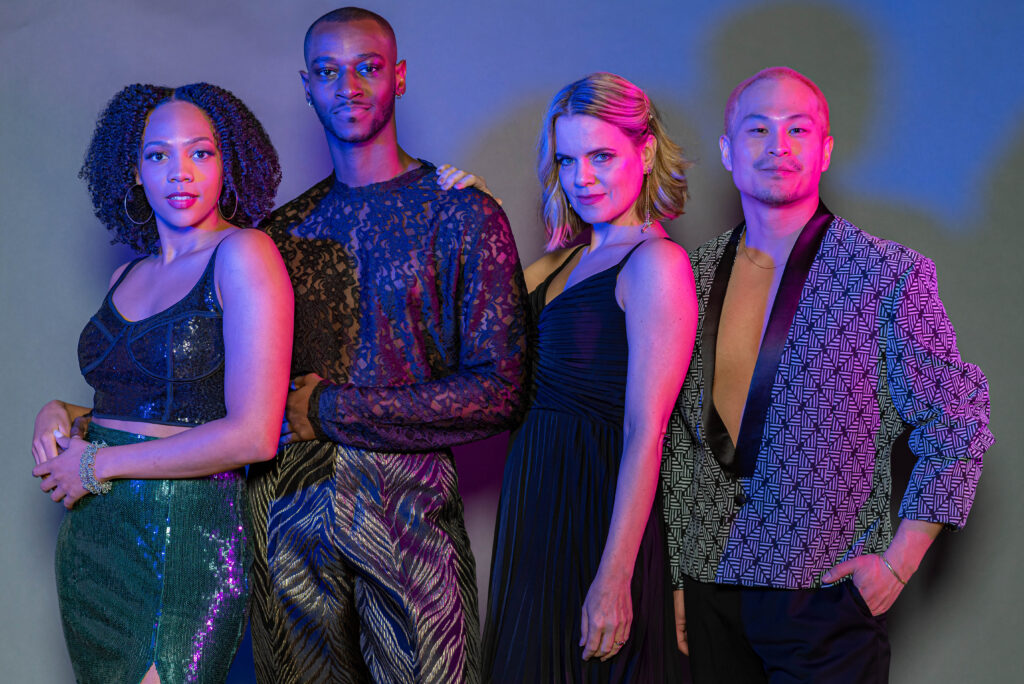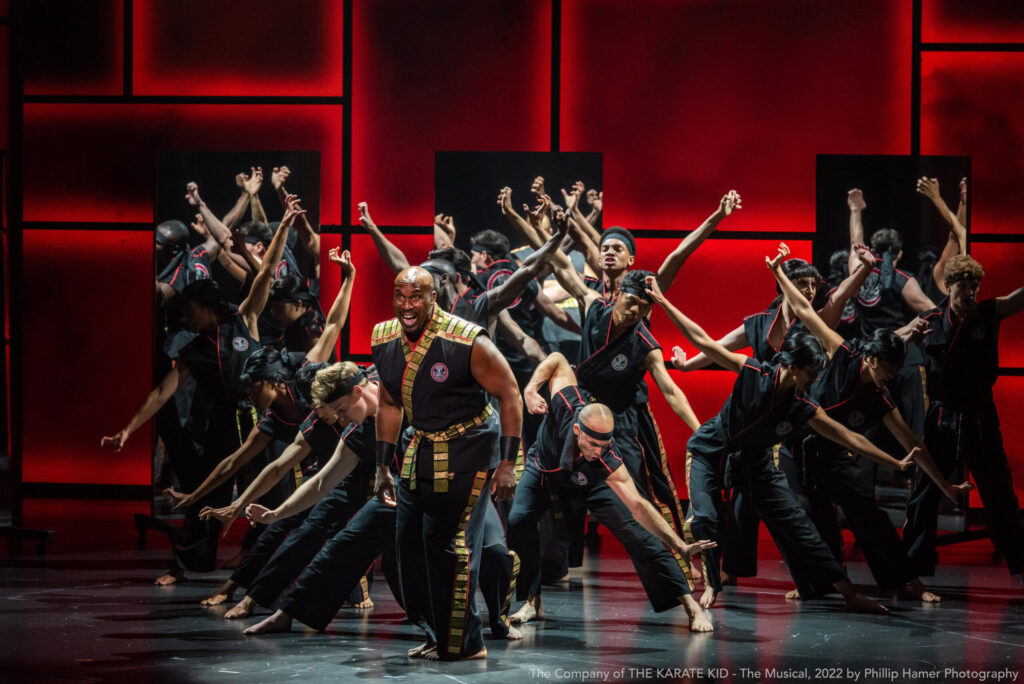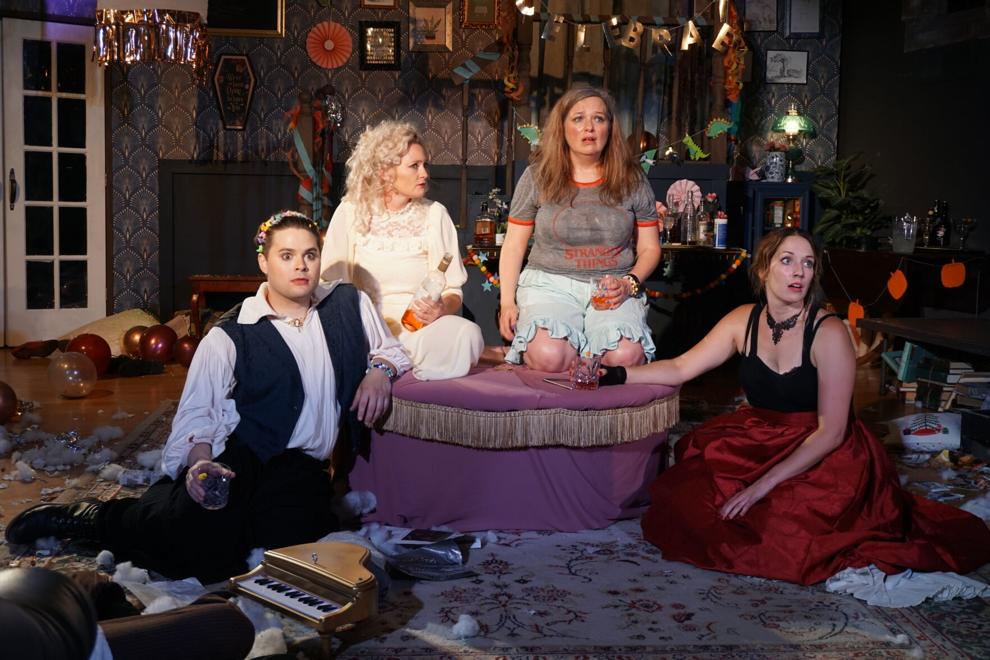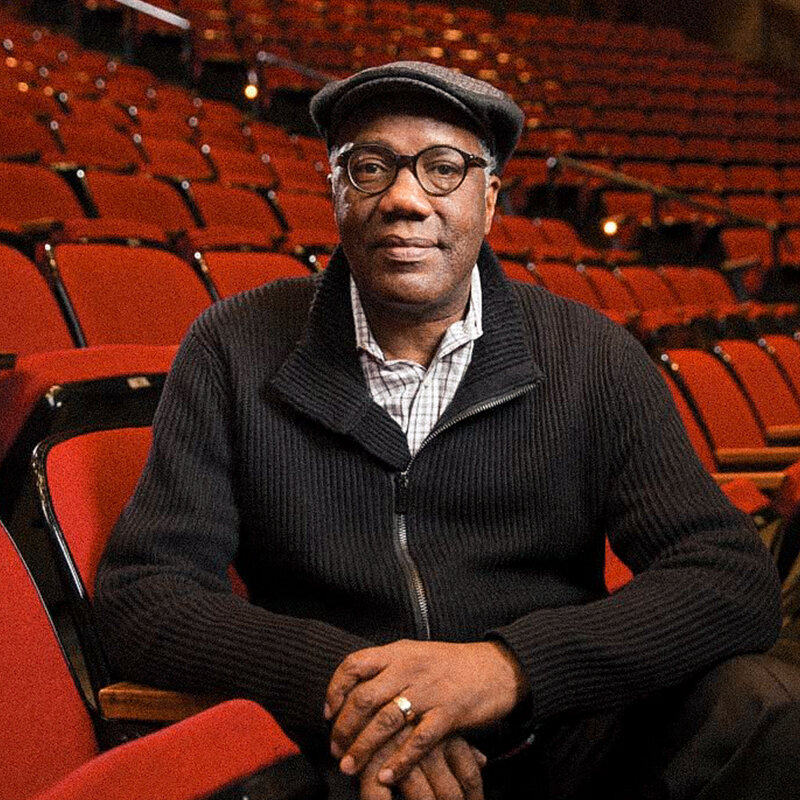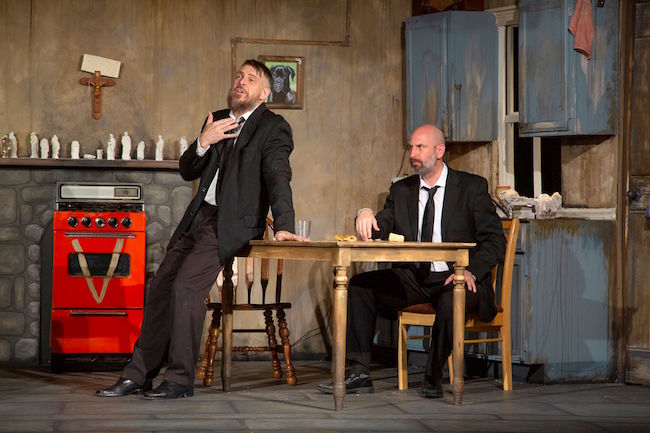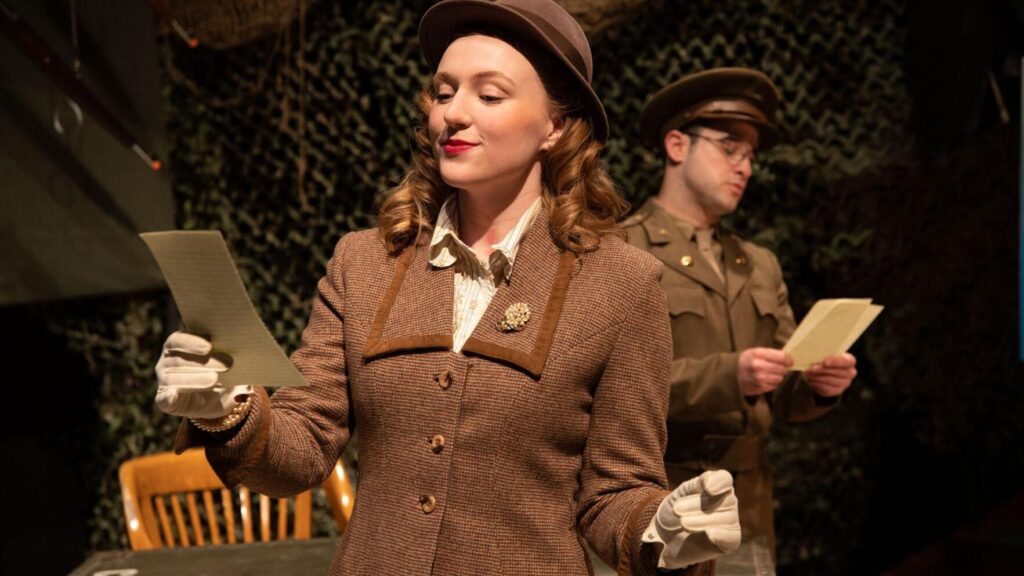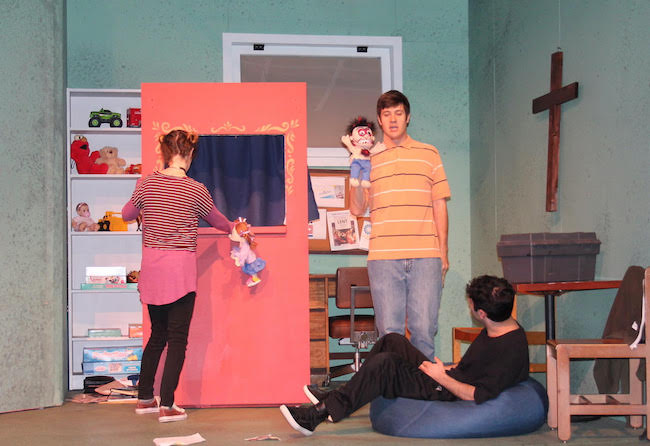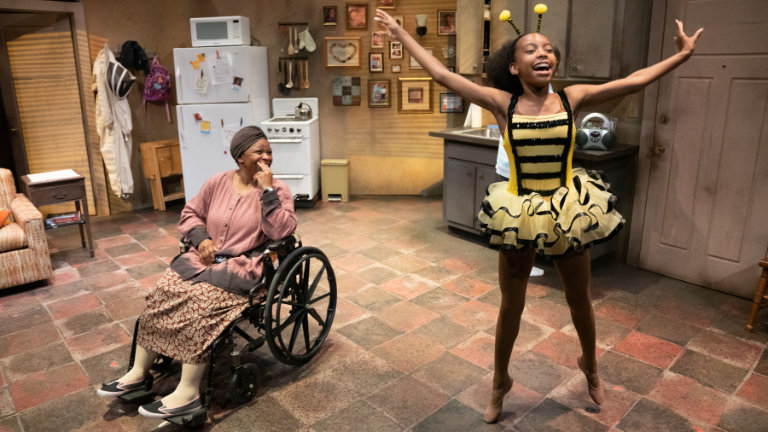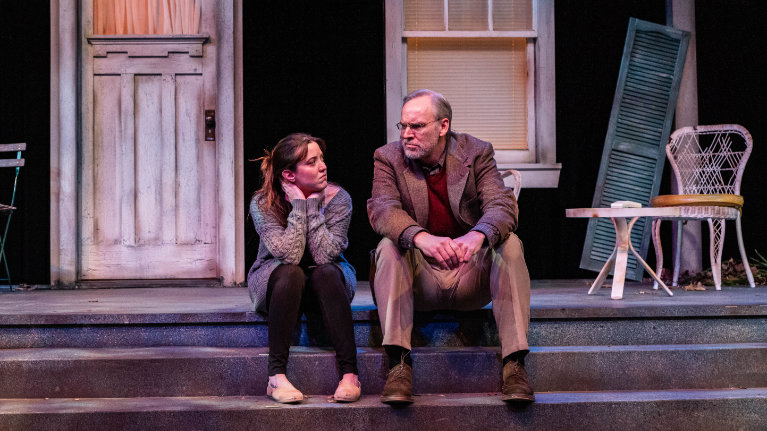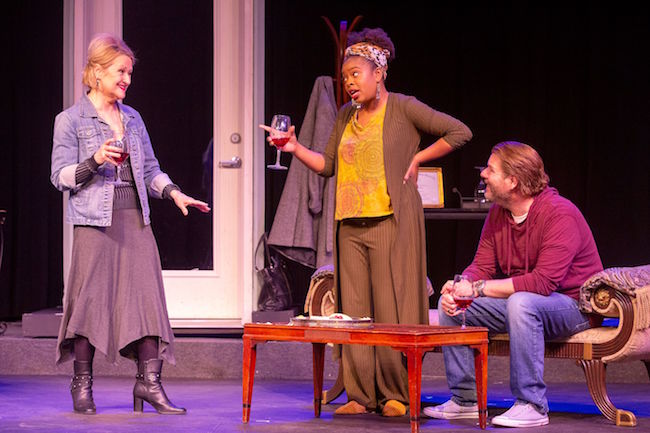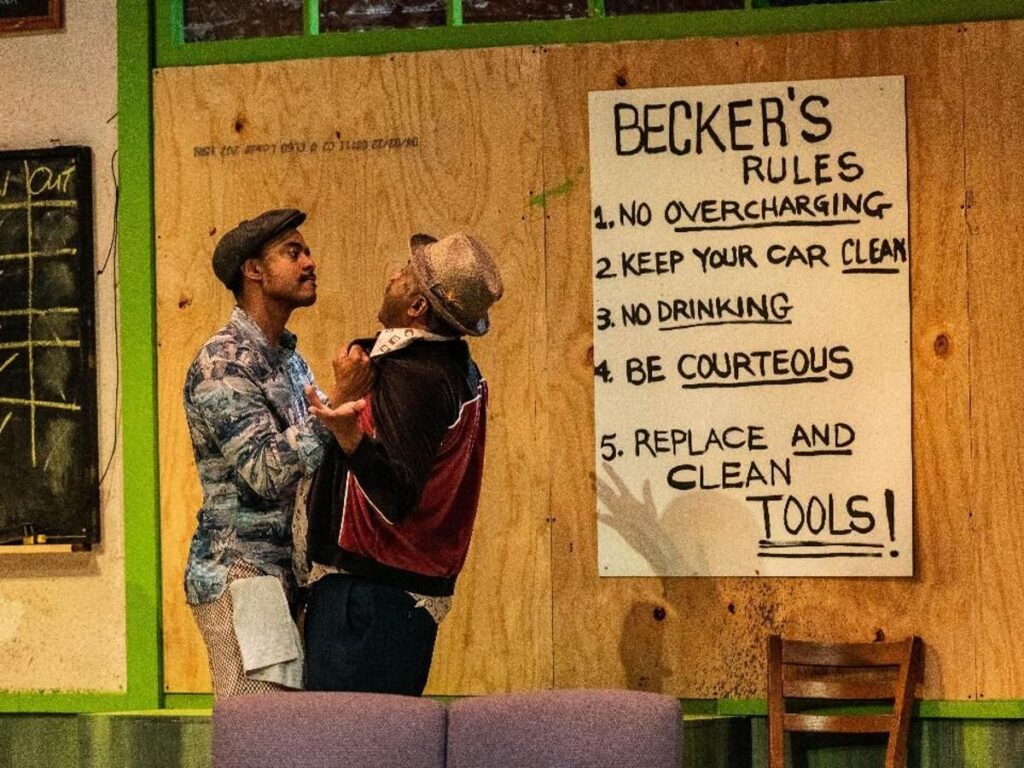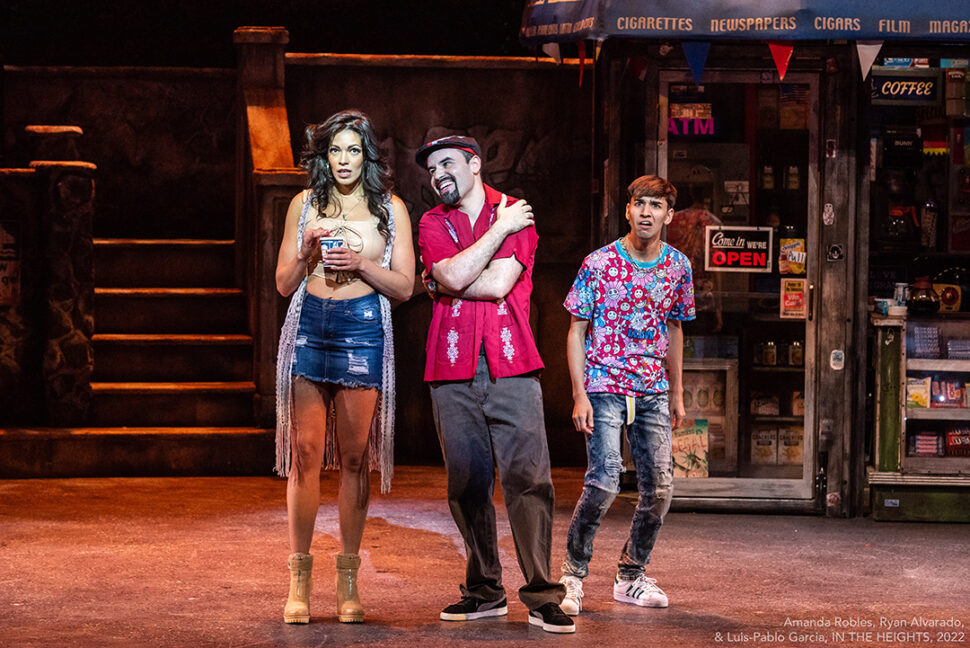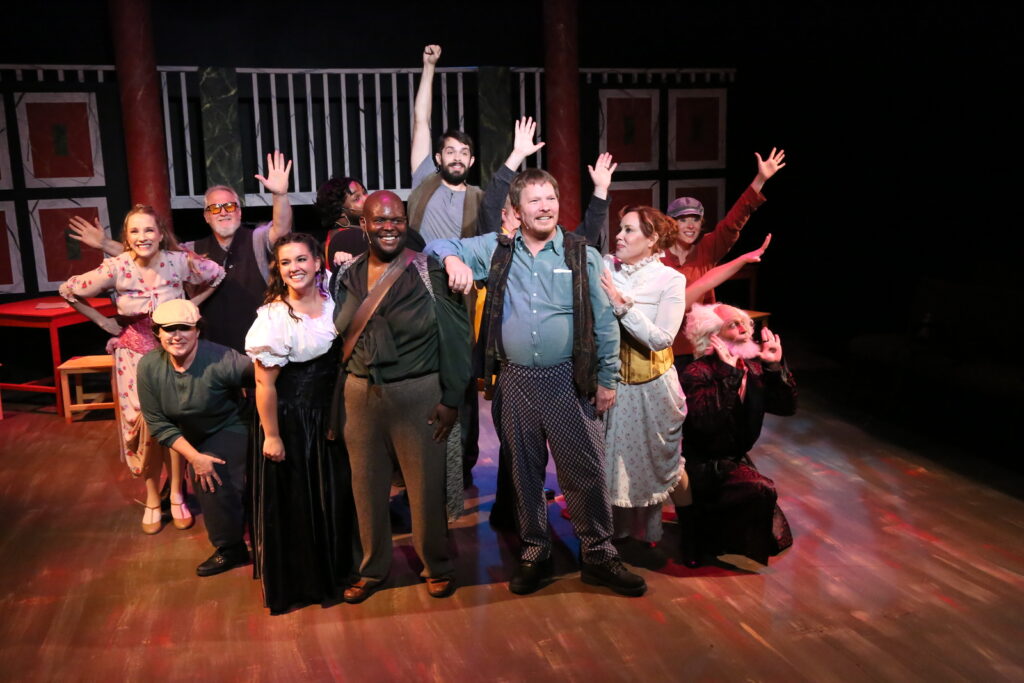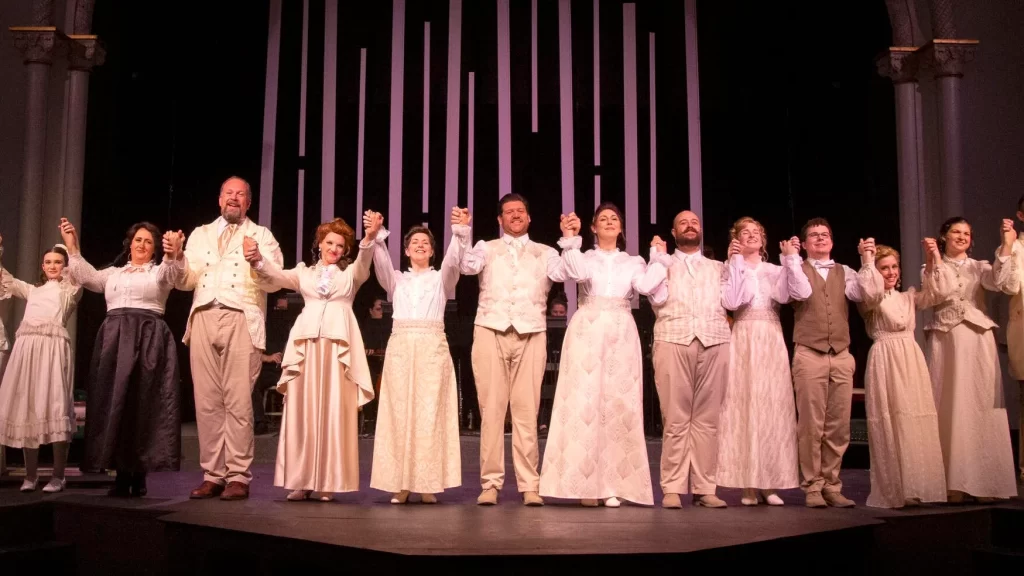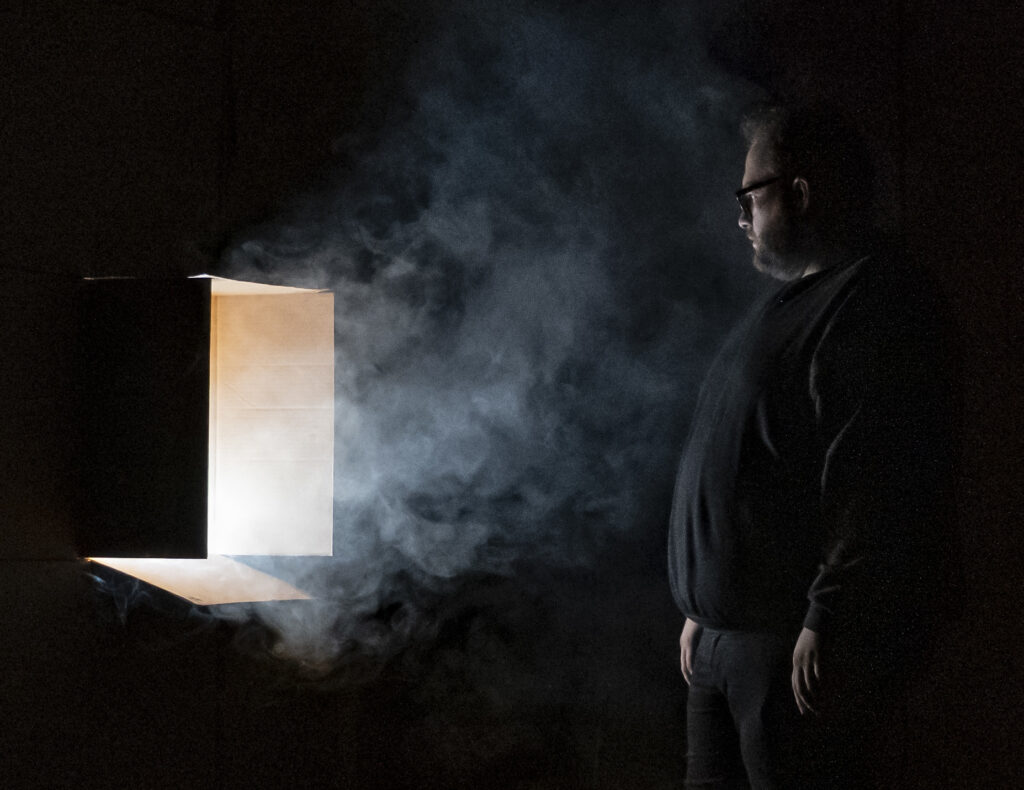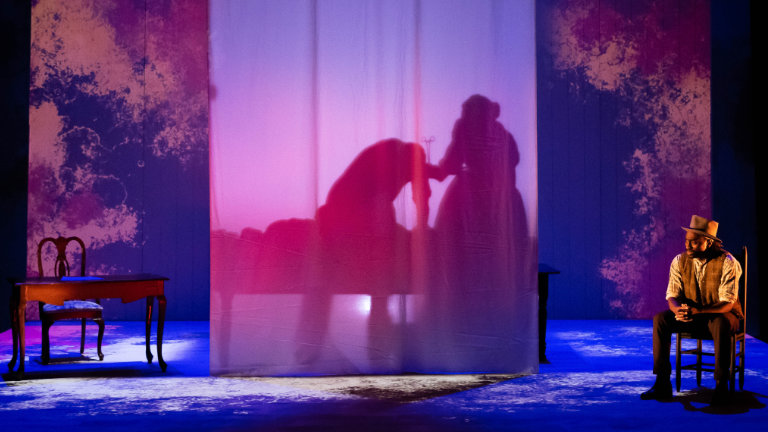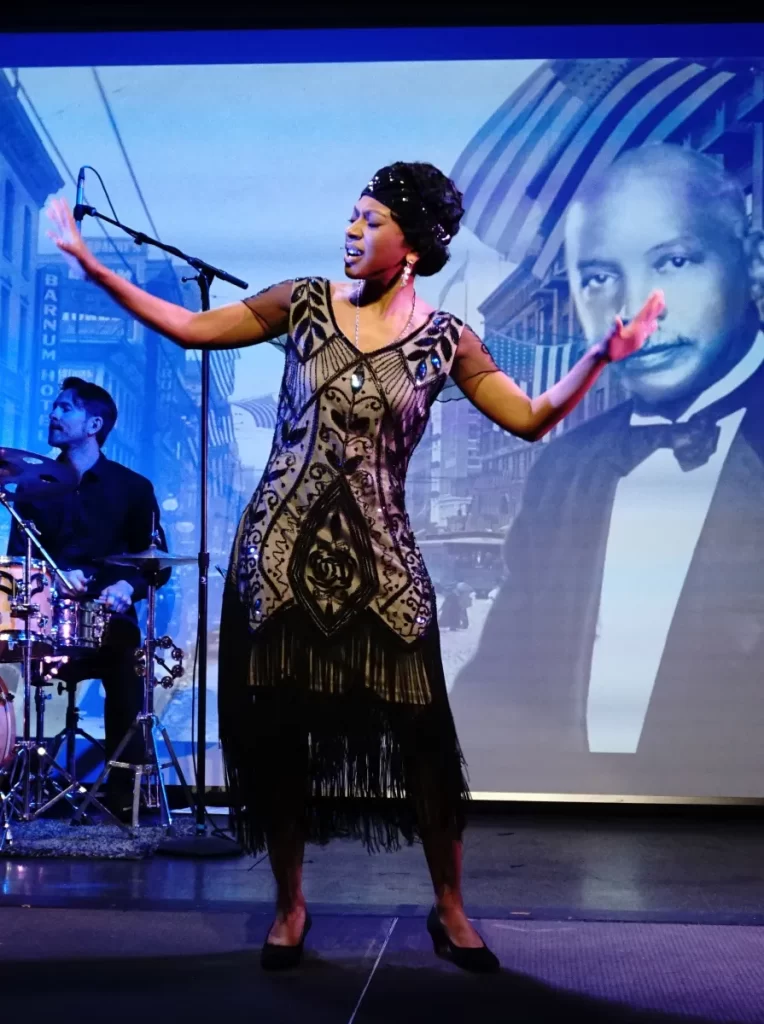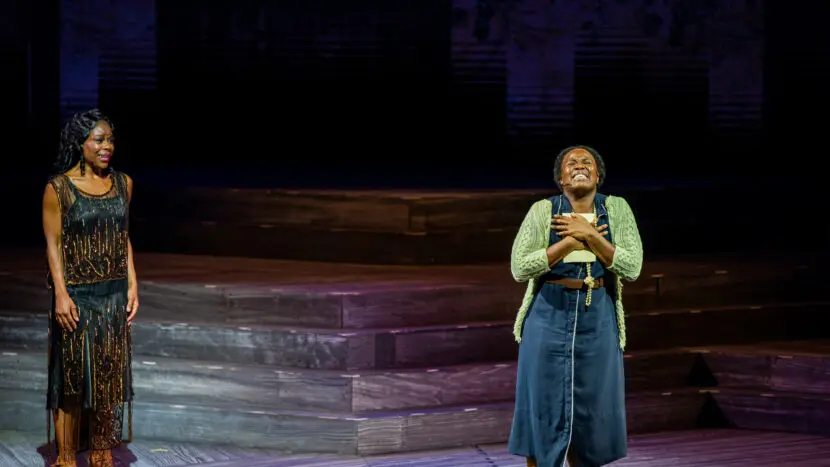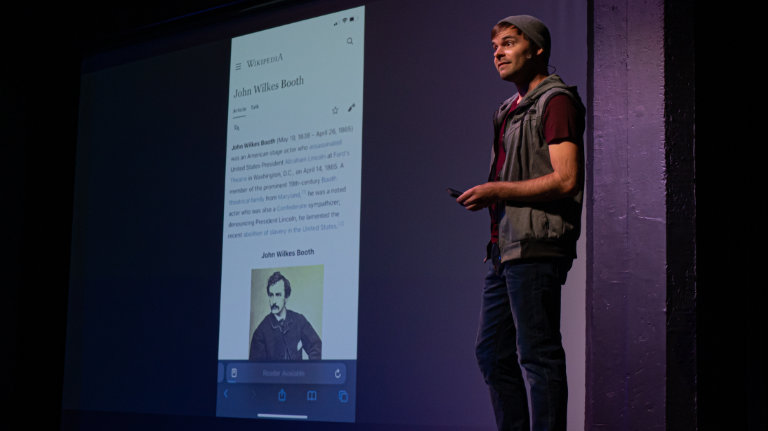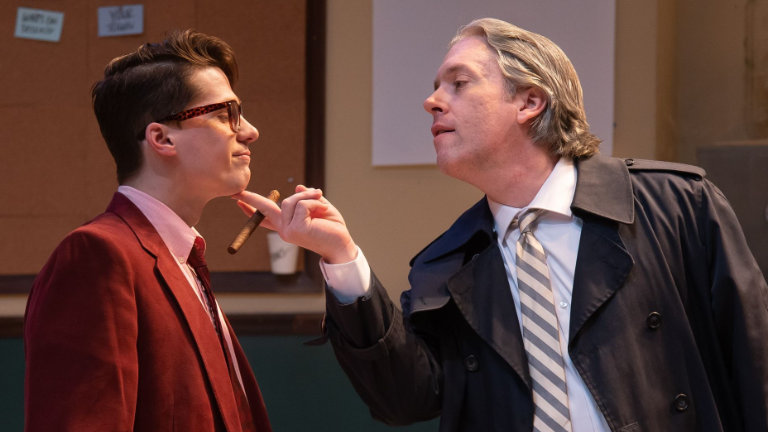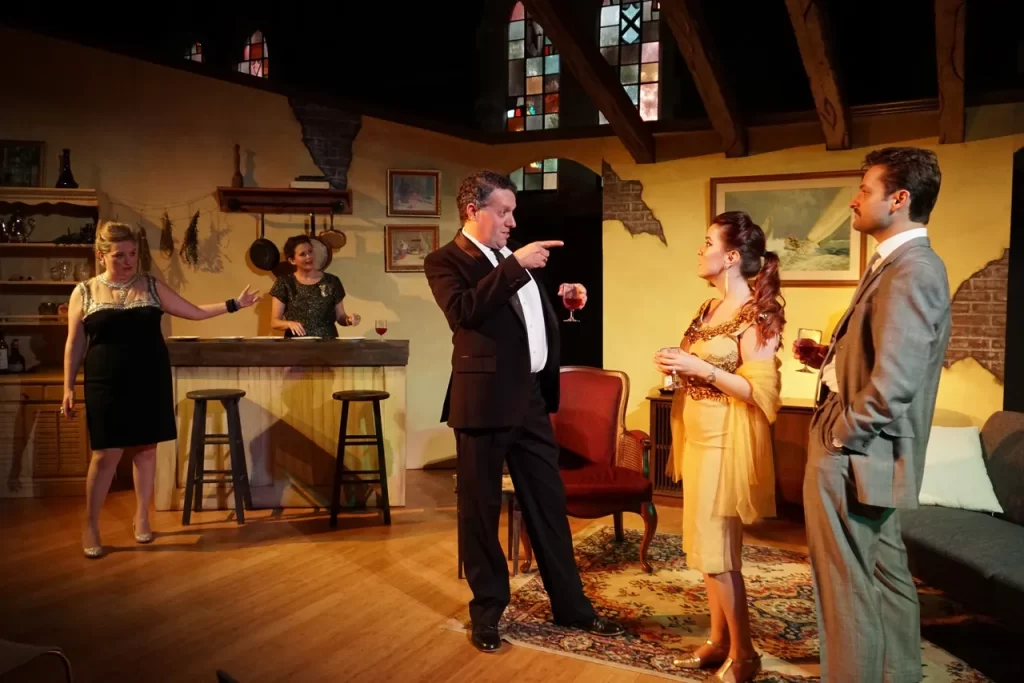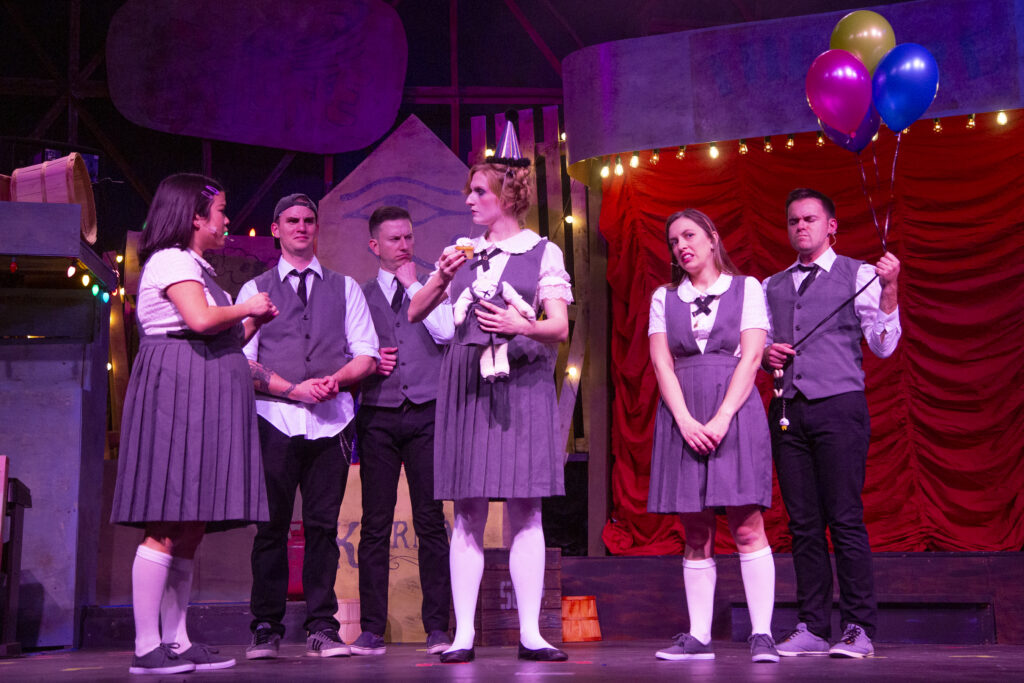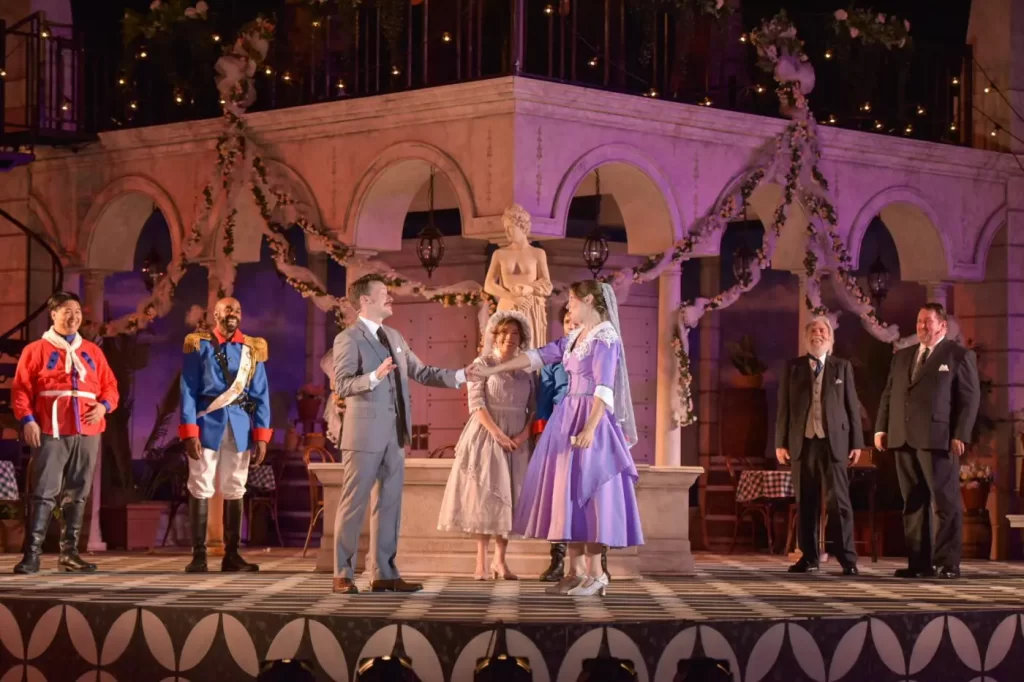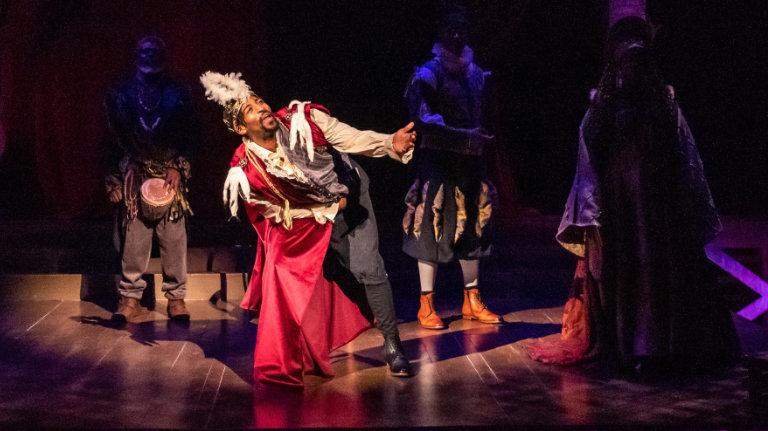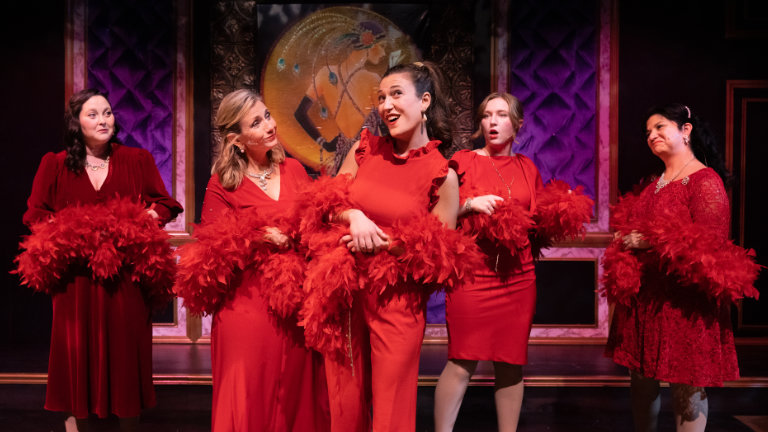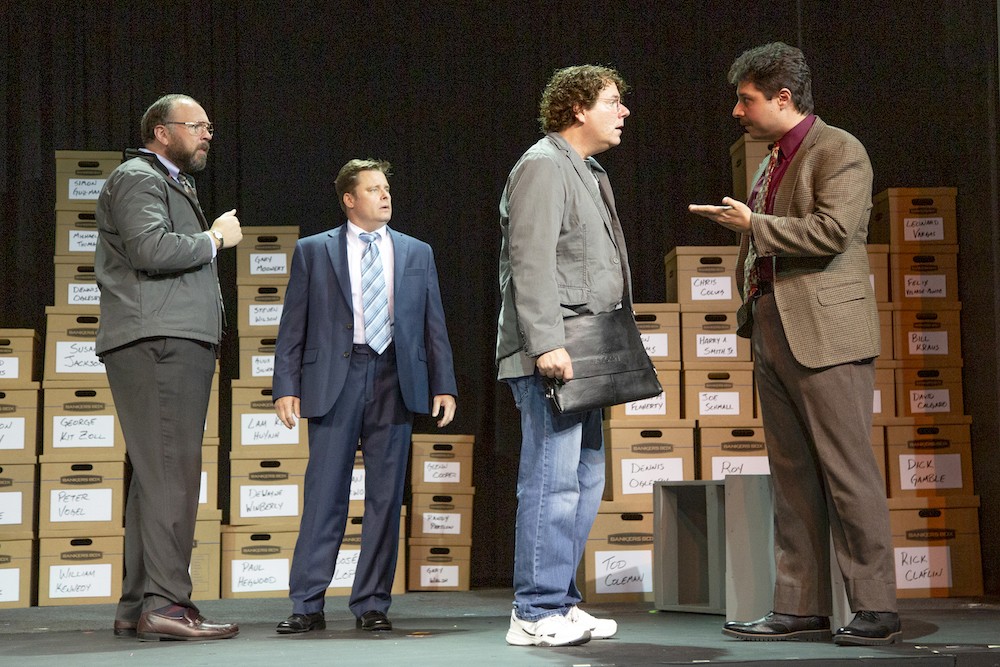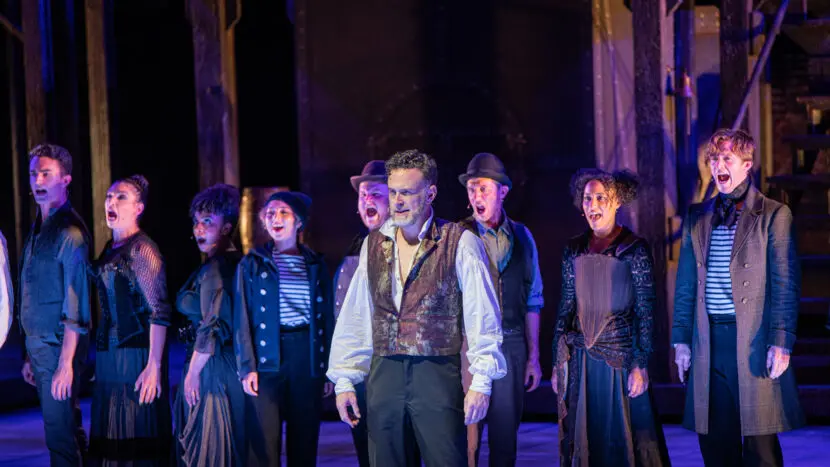By Lynn Venhaus
The crème de la crème of local female vocal talent displays why they have earned those reputations in a lusty version of “Nine,” an exotic Felliniesque musical being presented by New Line Theatre March 2-25.
Based on filmmaker Federico Fellini’s 1963 semi-autographical angsty-existential-fantasy masterpiece “8 ½,” Tony-winning composer-lyricist Maury Yeston has tackled the age-old conundrum about a woman’s relationship to a man in an expressive, emotional score. Ballads are rueful, company numbers are vigorous in this 1982 musical. Yeston, who started this project in college in 1973, also won a Tony for the 1997 “Titanic” musical.
New Line’s glamorous production has a cast of 13 females who are connected to celebrated director Guido Contini, a womanizer going through a midlife personal and professional crisis.
Set at a Venetian spa in the early 1960s, an exasperated Luisa Del Forno (Lisa Karpowicz) has gone there with her preoccupied husband Guido (Cole Gutmann) to save their troubled marriage. Karpowicz makes you feel her pain, and her best number is the poignant “My Husband Makes Movies.” After all her sacrifices and his infidelities, she sings a mournful “Be On Your Own.”
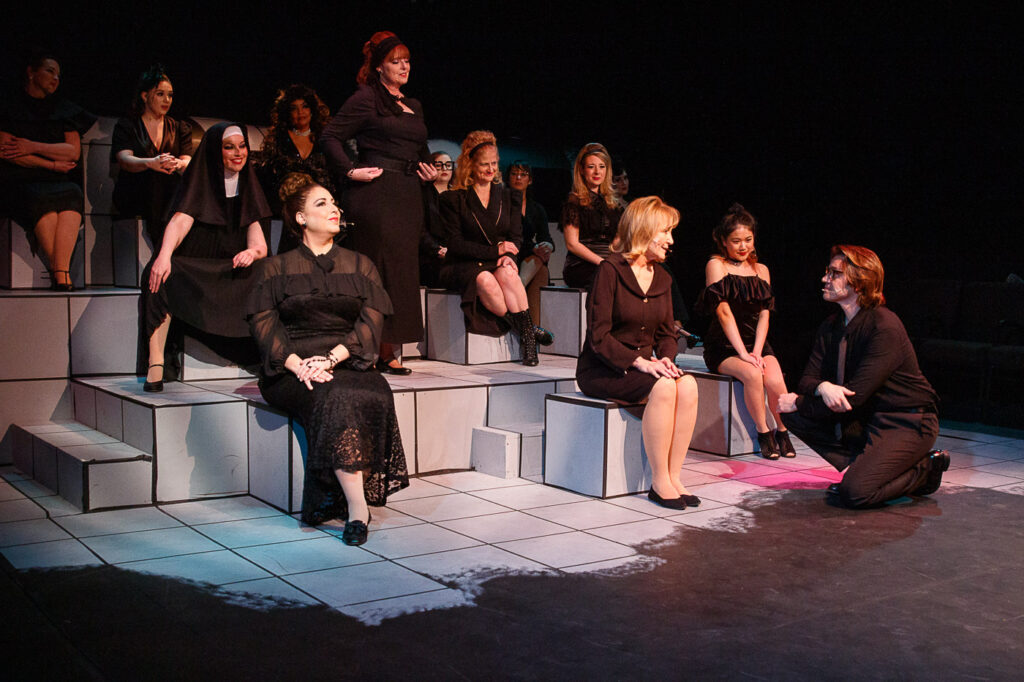
He’s a cad, the boy who never grew up, and while smart and chic, she’s more of a caretaker. He does seem to care, but obviously has commitment issues, and they really don’t have much spark left. Contini (you’ll never forget his name because they say it over and over) brought all this misery on himself and is caught in a web of his own lies.
Discovered by the paparazzi, Guido tells reporters he is there to direct his latest film. Three previous movies have flopped, and the pressure is intense. His tough film producer, Liliane La Fleur (a flamboyant Kimmie Kidd-Booker), wants him to make a musical.
Gutmann conveys Guido’s desperation as he tries to come up with his next big picture, spinning tall tales and improvising with a riff on Casanova. His macho meltdown is precipitated by his turning 40, writer’s block, and his shabby treatment of people.
Has he run out of things to say? As the chaotic circus of his life flashes before our eyes, we see what the women have meant to him and what they have put up with – which makes him mostly unsympathetic. Can he change into a better person?
As the magnetic Guido, Gutmann is obsessive and frantic interacting with his mother, wife, teacher, temptress, mistress, muse, younger self, and other people who cross his path.

Gutmann has a rich melodic voice and the confident stage presence to pull off this conflicted character, but because the center of attention is often a jerk, it’s not that easy to emotionally connect to Guido, no matter how famous, important, handsome, and charming he is.
But Gutmann’s soulful delivery of his numbers – especially “Guido’s Song” and “I Can’t Make This Movie” — and his willingness to show the guy at his worst, makes you appreciate his skills. It’s a very demanding, energetic role, as he is on stage about 95 percent of the time.
The drama does have humorous moments but the book by Arthur Kopit seriously attempts to make a statement on artists, the creative process, and one’s demons and desires. Yet, it’s mostly a psychoanalysis of a self-absorbed talent, a male-centered fantasy and it runs hot and cold.
The story flips from real to invented, often taking place in Guido’s head, as he explores his past and present relationships.
Co-directors Scott Miller and Chris Kernan capitalize on the strength of the performers in their minimalist staging, keeping in mind the necessary surrealism. Kernan also choregraphed the movements to be functional, simply depicting moods and attitudes.
The ensemble moves the story forward with added oomph, starting with the exquisite harmonies in the opening “Overture Delle Donne.”
Because it’s about filmmaking, the company delivers melodramatic versions of “Not Since Chaplin,” “Western di Guido,” “Bible di Guido,” and “Documentary di Guido,” plus Guido’s exaggerated “The Script” and “The Grand Canal.”
Guttman is strong leading “The Bells of St. Sebastian,” which shows off the belters to close the first act. In keeping with the plot thread about how the Catholic religion affected his childhood, “Kyrie eleison” (“Lord, have mercy”) is repetitively sung.
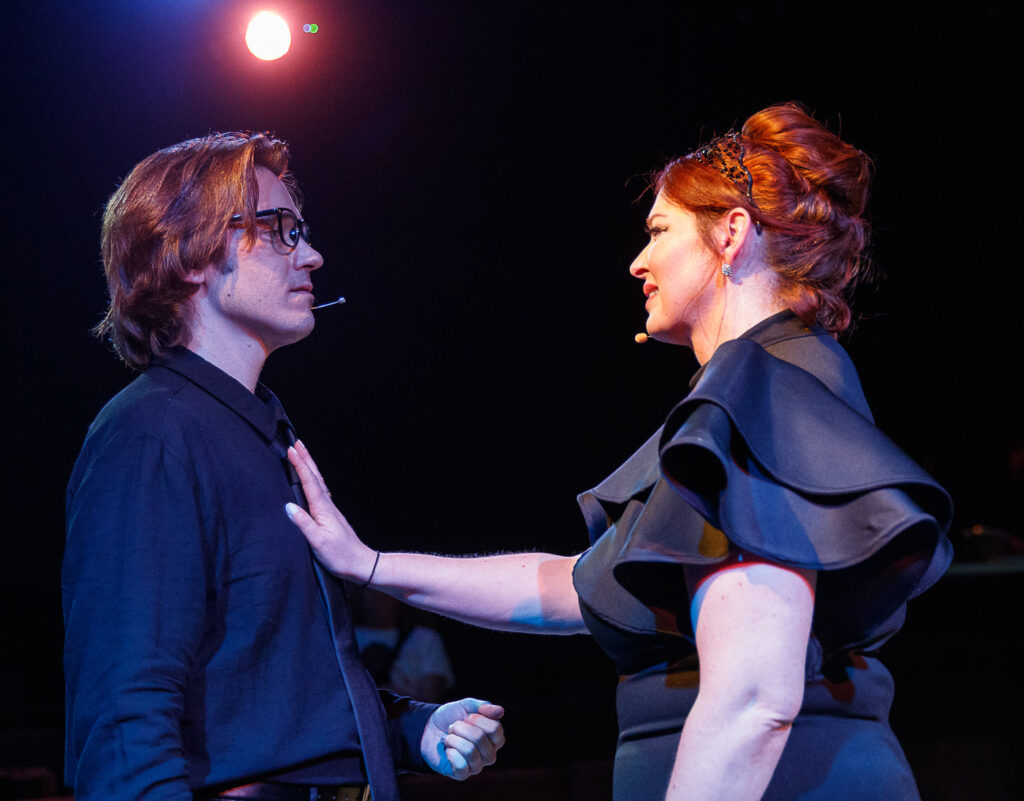
Throughout the two acts, which run 2 hours and 15 minutes, with a 15-minute intermission, the women sit on a striking black and white set cleverly designed as cubes by Rob Lippert, moving off the steps onto the tiled floor for various processions in a dream-like way.
Like a black-and-white film, this work contrasts darkness and light, and this staging uses that aesthetic to its advantage. Lighting designer Matt Stuckel heightens the shadows effectively.
Costume Designer Sarah Porter has outfitted the women in cosmopolitan black apparel that reflects their characters’ personalities and the period styles, while Gutmann’s all-black attire comfortably suits the role.
Music Director Jenna Lee Moore, making her New Line debut and playing keyboard, deftly leads a cohesive orchestra – Tyler Davis on cello, John Gerdes on brass, Lea Gerdes and Joseph Hendricks on reeds, Mallory Golden on violin, and Clancy Newell on percussion.
Ryan Day’s sound design works well at The Marcelle.
The spa sojourn doesn’t turn out as planned. Guido’s mistress, the young and sexy Carla Albanese, shows up. Sarah Wilkinson is a fireball, agile in movement and frisky in “A Call from the Vatican.” She nimbly maneuvers her slinky, satiny mini-dress with bike shorts underneath. Lovely as well in voice, she tugs at the heartstrings in “Simple.”
His muse, actress Claudia Nardi (Ann Hier Brown) has previously been an inspiration, so she is called again in that capacity. However, their relationship is complicated, and she holds her ground. Brown’s luscious mezzo soprano is sublime in “A Man Like You” and the plaintive “Unusual Way.”
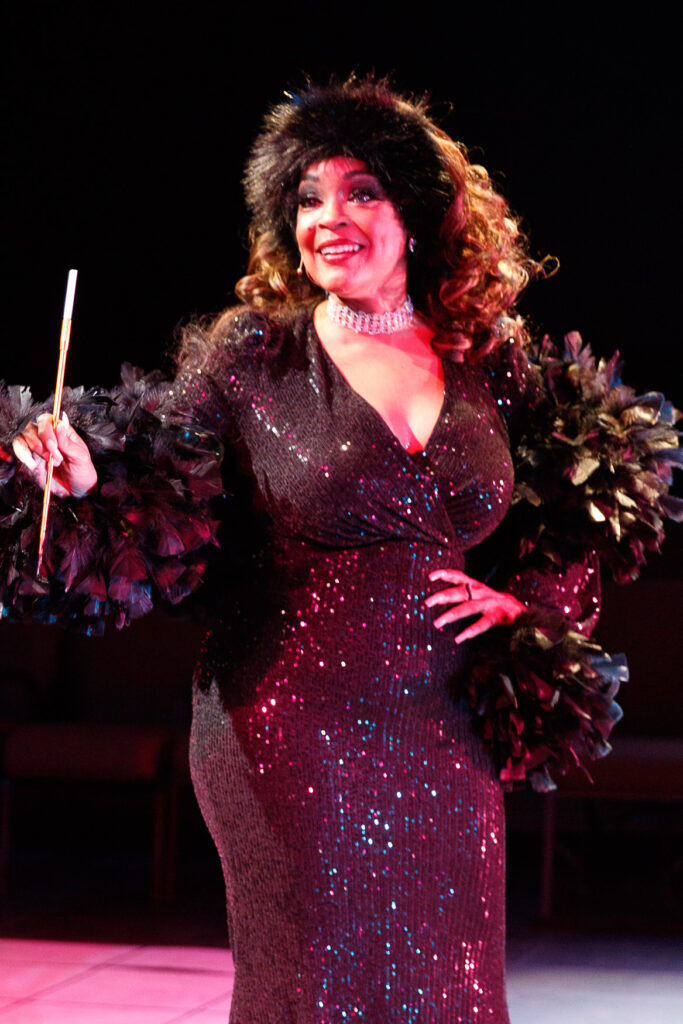
Another highlight is big personality Kidd-Booker, hamming it up and interacting with the audience in her robust “Folies Begeres.” After all, Liliane is a former showgirl, and Kidd-Booker is a scene-stealer as a diva.
Guido’s mother is played sentimentally by Stephanie Merritt, featuring her outstanding operatic voice. As an apparition, she is tender towards her genius son, yet she is aware of his faults. Merritt may be younger than the role calls for, but she appropriately projects the loving mother’s nurturing side and dazzles in the title number, “Nine.”
A seductive Sarah Lueken plays the local prostitute Saraghina from Guido’s youth, seen costumed as a nun. She made an indelible impact on him at age 9, and he must face that truth. Her rousing “Be Italian” is provocative, and the company joins in the naughty fun, using tiny tambourines for effect.
Gillian Pieper is sardonic as Stephanie Necrophorus, a writer and film critic not enamored by Guido neither as a man or a visionary and is downright hostile as she disapproves.
Much of the action takes place in the spa. Kathleen Dwyer is the hospitable manager Mama Maddelena, and a flirty, comical Annabella, while Kay Love is the ethereal Our Lady of the Spa, giving off a spiritual vibe. Then there are spa workers and guests, who are chorus and dancers – Olga (Julia Monsey), Renata (Chelsie Johnston), Diana (Kat Bailey) and Juliette (Brittany Kohl Hester).
Monsey is also Lina Darling, Liliane’s bodyguard. Hester is also the voice of little Guido, and sings the significant “Getting Tall.”
Normally, a little boy is featured in the cast, but New Line uses Hester’s fine vocals and a portrait instead as the young Guido. Like the 2003 Broadway revival, they have dropped “The Germans at the Spa.”
This tale has been an awards magnet and conversation piece since the iconic film debuted 60 years ago, and then became a musical in 1982, revived in London in the ‘90s, then on Broadway in 2003 and film adaptation of the musical (and original film) in 2009. It’s one of those unorthodox works that you may not comprehend completely at first glance, but perception deepens in time and repeat viewings.
It remains maestro Fellini’s chauvinistic source material, nevertheless.
Fellini’s elegant Italian film won two Oscars, for Best Foreign Language Film and for costume design in 1964, and was also nominated for best director, screenplay, and art direction-set decoration (black and white).

The musical, and New Line’s interpretation, forego other male characters, trims the women to manageable cast size, cuts the constant smoking and omits Guido’s snazzy hat that Marcello Mastroianni wore.
1963 was a very different time for women, so it’s good to have some cuts, such as the harem scene, Mastroianni’s disturbing whip-cracking, and revisions in dialogue.
However, I wished the playwright would have kept the movie’s best line: “Happiness consists of being able to tell the truth without hurting anyone.”
(An aside: my college film professor adored Fellini, so I was introduced to his films as a student. I struggled with his ideas and images back when I was a teen, but upon watching as an adult, it’s a stirring avant-garde work, and Claudia Cardinale takes your breath away. If you are an HBOMax subscriber, the original “8 ½” in glorious black-and-white and the filmed musical “Nine” are available streaming).
The 1982 musical received 12 Tony Award nominations and won five, including Best Musical, Tommy Tune as director, Yeston for score, Liliane Montevecchi for featured actress as Liliane Le Fleur, and William Ivey Long for costume design. Receiving nominations: Raul Julia as Guido, Karen Akers as Luisa, Anita Morris as Carla, Kopit for book, Thommie Walsh for choreography, lighting design and scenic design.
The 2003 Broadway show earned nine Tony Award nominations, winning for Best Revival and Jane Krakowski for featured actress as Carla, with Antonio Banderas as Guido, Mary Stuart Masterson as Luisa, Chita Rivera as Liliane, director, lighting design and orchestrations nominated.
The film version of the musical, directed by Rob Marshall and starring Daniel Day-Lewis as Guido, was not well-received in 2009, but earned four Oscar nominations for Penelope Cruz as Carla, Maury Yeston for the original song “Take It All,” costume design and art direction.
This cinematically inspired musical, because it’s not typically structured, is more difficult than many other modern theatricals, and is not often produced. While its themes are intriguing, it can be frustrating for those unfamiliar with how the plot unfolds. Yet, the characters are passionate and the music sophisticated, so performers willing to risk the challenge can make their mark.
The focus in New Line’s crisp performance is the sense of collaboration instead of coming across as distant. This cast exhibits sincerity, brings out colors and feelings not always apparent, and appears to be on ‘Cloud Nine’ embarking on this journey.
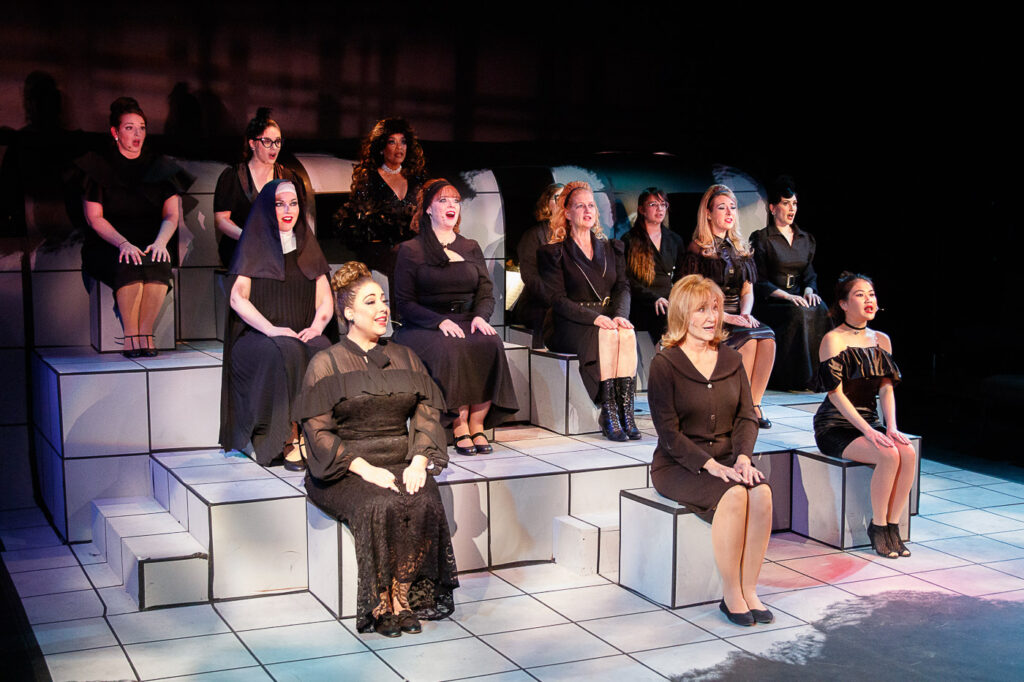
“Nine” runs March 2 – 25 at The Marcelle Theatre in the Grand Center Arts District, 3310 Samuel Shepard Drive. Shows are Thursday, Friday, and Saturday at 8 p.m. For more information, visit www.newlinetheatre.com, and for tickets, they can be purchased at metrotix.com or by calling 314-534-1111.

Lynn (Zipfel) Venhaus has had a continuous byline in St. Louis metro region publications since 1978. She writes features and news for Belleville News-Democrat and contributes to St. Louis magazine and other publications.
She is a Rotten Tomatoes-approved film critic, currently reviews films for Webster-Kirkwood Times and KTRS Radio, covers entertainment for PopLifeSTL.com and co-hosts podcast PopLifeSTL.com…Presents.
She is a member of Critics Choice Association, where she serves on the women’s and marketing committees; Alliance of Women Film Journalists; and on the board of the St. Louis Film Critics Association. She is a founding and board member of the St. Louis Theater Circle.
She is retired from teaching journalism/media as an adjunct college instructor.

